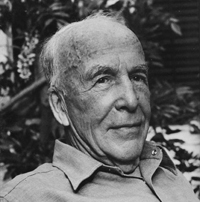 |
Archibald MacLeish |
No. 100 / Junio 2017
Archibald MacLeish
(1892 – 1982)
Traducción de Daniel Medina
Tres veces ganador del Premio Pulitzer, Archibald MacLeish fue un reconocido poeta norteamericano. Su mundo poético, por momentos completamente apegado al ideario modernista, puede resumirse en este Ars poetica, poema cuya relectura, recreación y redefinición es más que necesaria en estos tiempos.
Ars poetica
A poem should be palpable and mute
As a globed fruit,
Dumb As
old medallions to the thumb,
Silent as the sleeve-worn stone
Of casement ledges where the moss has grown—
A poem should be wordless
As the flight of birds.
*
A poem should be motionless in time
As the moon climbs,
Leaving, as the moon releases
Twig by twig the night-entangled trees,
Leaving, as the moon behind the winter leaves,
Memory by memory the mind—
A poem should be motionless in time
As the moon climbs.
*
A poem should be equal to:
Not true.
For all the history of grief
An empty doorway and a maple leaf.
For love
The leaning grasses and two lights above the sea—
A poem should not mean
But be.
Ars Poetica
Un poema ha de ser palpable
y mudo como fruta redonda.
Mudo
como un viejo medallón entre los dedos.
Silente como piedra suave,
como piedra visible tras el musgo y la ventana.
Un poema entonces, ha de ser
como el vuelo de los pájaros.
*
Un poema ha de ser inmóvil en el tiempo
como la luna cuando asciende,
atravesando junto a ella
y rama tras rama, la noche con sus árboles.
Y como la luna tras las hojas del invierno,
va olvidando nuestra mente las palabras.
Un poema ha de ser inmóvil en el tiempo,
como lo es la luna cuando asciende.
*
Un poema ha de ser igual
a una mentira.
Para toda la historia que nos duele,
un camino vacío y una hoja cayendo.
Para el amor
golpeadas hierbas y dos luces sobre el mar.
Un poema no ha de significar nunca,
sino que ha de ser por un momento.


